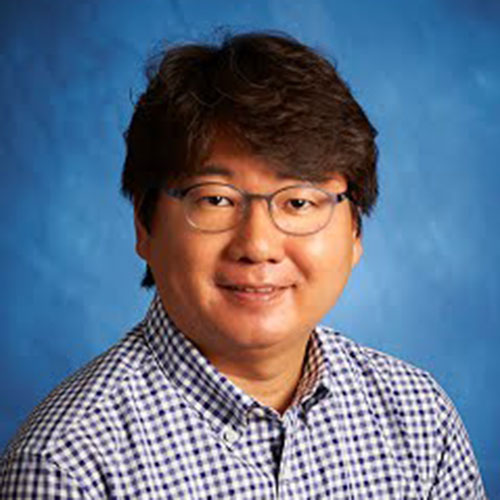Soo-yong Byun2017 Rising Alumni

Soo-Yong Byun is a comparative and international development education Ph.D. graduate, and has made a mark in academia as an Associate Professor of Educational Theory and Policy at Penn State University. Though still early in his career, he is highly regarded for his interdisciplinary research using large, international data sets. His work focuses on areas where past research has been limited and thus not generalizable to other contexts.
Employer
Associate Professor of Educational Theory and Policy, Pennsylvania State University
CEHD Degree
Ph.D., Educational Policy & Administration, 2007
Please list any professional accomplishments you wish to mention.
I have been fortunate to collaborate with brilliant scholars in a variety of social science fields including education, sociology, and psychology. These experiences provide the foundation for innovative and interdisciplinary research using large-scale national and international data, especially in educational research areas where much research remains qualitative and small-scale, and thereby limits or precludes generalizability and potential transferability to a broader context.
Since I graduated from the University of Minnesota in 2007, I have published more than 50 articles in peer-refereed journals, including American Educational Research Journal, American Journal of Education, Comparative Education Review, Research in Higher Education, Review of Higher Education, and Sociology of Education. In addition, I have authored and co-authored 10 book chapters and a number of reports to sponsoring organizations. Furthermore, since 2007, I have made more than 100 presentations and co-presentations at major national and international professional meetings, including American Educational Research Association, American Sociological Association, Comparative and International Education Society, and International Sociology Association Research Committee on Social Stratification and Mobility (RC 28).
I have served on multiple editorial and advisory boards, including American Journal of Education, Research in the Sociology of Education, and Sociology of Education. Finally, I have obtained funding for collaborative research grants, totaling more than $5,500,000.
What is your favorite memory from the University of Minnesota?
My favorite memories include walking down to the Mississippi River during summer, walking across the Washington Avenue Bridge during summer and winter, visiting the Weisman Art Museum, having brunch in Dinkytown on Sunday, reading books at the Wilson library, and playing racquetball with my advisor, Dr. Gerald Fry.
What professor(s) or course(s) were most influential during your time in CEHD?
My co-advisors (Dr. David Chapman and Dr. Evan Schofer, now at the University of California at Irvine) and the members of my dissertation committee (Dr. Darwin Hendel and Dr. Christine Wotipka, now at Stanford University) provided me with intellectual insights and sustained encouragement. I was also indebted to Dr. Gerald Fry, who had been my advisor for the first three years of my doctorate study, as well as Dr. Darrel Lewis, who served as a reader for the oral preliminary examination. In addition, as a research assistant, I was honored to work with Dr. Charlie Lakin and Dr. Sheryl Larson at the Research and Training Center on Community Living housed within the University’s Institute on Community Integration. In terms of courses, I benefited a lot from quantitative research methods courses offered by Drs. Michael Rodriguez, Geoffrey Maruyama, and Jeffrey Long (now at the University of Iowa).
Who has inspired you the most during your career?
It is hard to pick one but I would say that Dr. Evan Schofer, who was my co-advisor at the University of Minnesota but is now in the University of California at Irvine, is a major inspiration in my career. He is very patient, trusting my ability to make a contribution to the research community. Also, my mom, who sacrificed whatever it took to provide me with a good education, is always a major inspiration.
What was the impact and benefit of your educational experience in CEHD?
I wouldn’t be who I am today without the academic, financial, and emotional support that I received in CEHD. Faculty members provided me with rigorous training and invaluable guidance. My friends and colleagues in CEHD also provided with consistent emotional support.
What skills are important to succeed as an emerging professional today?
Collaborative skills, diligence, critical & creative thinking.
When you have 30 minutes of free time, what do you do?
I like sports, especially tennis and golf. Although 30 minutes are too short to do this sports, I would still want to do this.
How do others describe you?
Others may probably describe me as a highly motivated and busy man.
How do you describe yourself?
I see myself as always wanting to have positive thinking and attitude and a good sense of humor.
What's a good book you'd recommend to others?
“Grit” by Angela Duckworth
If you could have coffee with anyone from history, who would it be?
I would like to have coffee with Moo-hyun Noh, Former South Korean President. I also would like to have coffee with my mom, who passed away while I was studying at the University of Minnesota.
What gets you excited about work?
Having conversations with my colleagues and students and learning about their research and thinking. I also get excited about knowing that my research papers have been cited in various ways.
When you were a kid, what did you want to be when you grew up?
First an English teacher in high school, and then a professor. I am happy that my dream came true.
Outside of your job, how do you grow professionally?
I love to travel and attend professional conferences because it allows me to learn something new and to meet with many new and old colleagues and friends. I also like to read new journal articles.